
4Alpha Research Researcher: 0xamuel
Recently, The Nakamoto Project released a research report on US Bitcoin holders.The report analyzes the adoption of Bitcoin in the United States from three aspects: demographic characteristics, political tendencies and moral basis, and aims to explore other factors that may affect Bitcoin holdings and attitudes besides standard demographic data.
Summary of key points
-
Young men tend to hold Bitcoin: Bitcoin holders are usually younger and mostly male, but in other ways, such as race, ethnicity, income, education, and financial literacy, they are generally similar to the U.S. population.
-
Bitcoin holding has nothing to do with political factors: Despite significant differences in attitudes towards Bitcoin between different American political parties, The Nakamoto Project expects that such differences may lead to extreme results, such as conservatives and liberals may be more willing to hold Bitcoin.However, the survey results show that there is no significant relationship between Bitcoin holdings and political tendencies.The number of Bitcoin holders in the United States is basically the same in different political contexts.
-
The values of Bitcoin holders: Investigation uses Moral Foundations Theory to analyze the values and identity of Bitcoin holders.The results show that Bitcoin holdings have no obvious correlation with a specific moral basis.By contrast, Bitcoin holdings are more influenced by understanding the concept of Bitcoin, recognition of its protocols and assets, and moral perception of Bitcoin.
Research background
Although Bitcoin is already a household term, information about Bitcoin holders is relatively limited.Although about 95% of Americans know the concept of Bitcoin and about 1/7 of Americans currently own Bitcoin, detailed data is still scarce.
Although other institutions have conducted studies in similar directions, these studies often have limitations, such as small sample size, overly broad scope of research, or focusing only on a few indicators.Furthermore, most studies mainly discuss cryptocurrencies as a whole, rather than focusing on Bitcoin.Therefore, The Nakamoto Project focuses specifically on Bitcoin in this report and limits the scope of research to the United States.
To explore the popularity of Bitcoin in the United States, The Nakamoto Project collaborated with Qualtrics to survey 3,538 adult Americans.The survey aims to collect demographic information about respondents, their moral tendencies and their attitudes toward Bitcoin.The data collection was divided into two stages: the initial sample was collected in November 2023, with a total of 3,022 respondents; the supplementary sample was collected in March 2024, with an additional 516 respondents focusing on exploring Bitcoin ETF pairsThe impact of public perception.
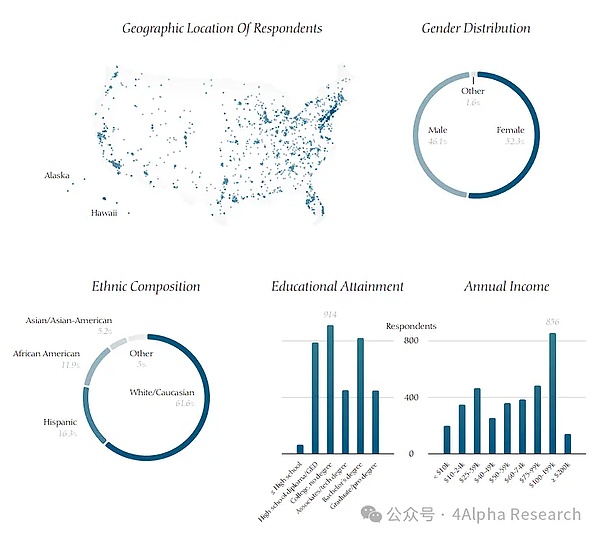
Demographic Characteristic Analysis
Research by The Nakamoto Project found that the U.S. Bitcoin holder group is very diverse.There is no significant difference between Bitcoin holders and non-holders in terms of race, ethnicity, religion, marital status, income, education level or financial literacy.From a demographic perspective, the two groups performed similarly on most indicators.However, Bitcoin holders differ significantly in age and gender:They tend to be younger and male.
The following figure shows the proportion of Bitcoin holders by gender and age.However, from a Block survey, this gender imbalance is not very obvious in the international sample and is only prominent in studies in the United States.
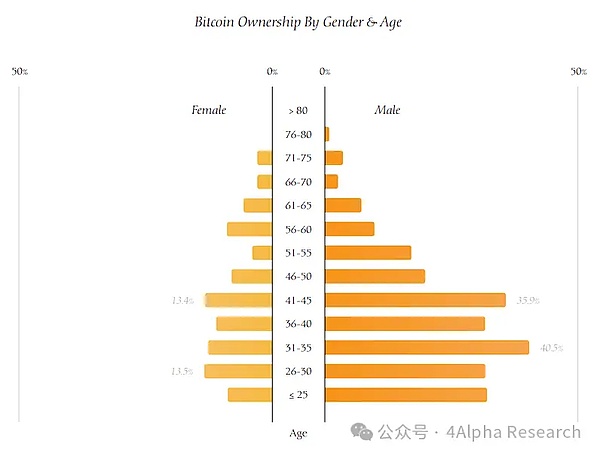
The impact of political inclinations on Bitcoin holders
From a political perspective, there is no significant difference between Bitcoin holders and non-holders.Although Bitcoin has been criticized by various political factions since its inception and has been particularly attacked by the political left in recent years, its strongest supporters are often Republicans and libertarians, which has led many to mistake Bitcoin for aa phenomenon of right-wing or libertarianism.As a result, many people think that Democrats or self-proclaimed liberals are unlikely to own Bitcoin.
To measure the political tendencies of Bitcoin holders, The Nakamoto Project designed five questions to explore the respondents’ self-positioning of their overall political stance, social issues, economic issues, and their own political stance.Although respondents responded to these questions differently, the results showed that the political distribution of Bitcoin holders was very similar to that of non-holders, with most people concentrated in the middle of the political spectrum.Bitcoin holders are more likely to think they are in extreme positions than non-holders, specifically manifested as more people consider themselves to be very liberal (+5.7%) or very conservative (+2.3%).
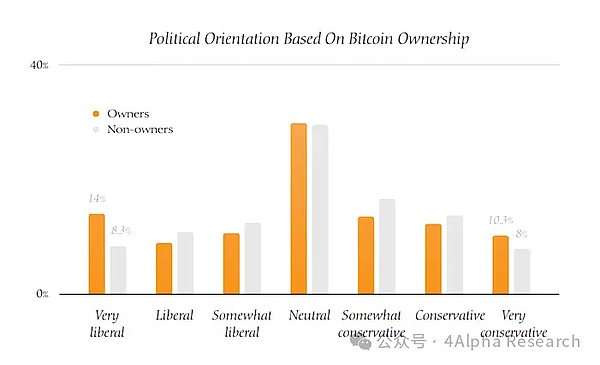
To make it clearer about the political tendencies of the respondents, The Nakamoto Project asked the respondents to score themselves 1-10 numbers. The lower the score, the more free the more conservative it is.Again, like non-holders, Bitcoin holders appear at each score and are more likely to appear in more extreme segments.But judging from the results, there is no significant difference between Bitcoin holders and non-holders on this scale.Surprisingly, respondents who claim to be very liberal were most likely to own Bitcoin (21.9%), followed by very conservatives (17.6%), while centrists had the lowest holdings (14.3%).
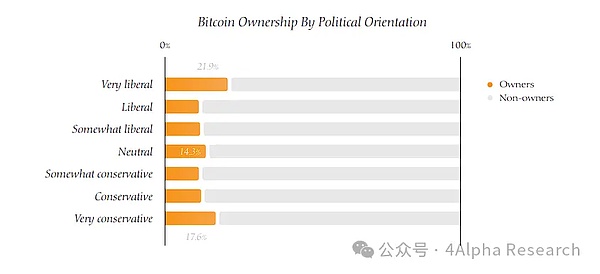
The only significant difference is that libertarians are more likely to hold Bitcoin, although they make up a very small percentage of the respondents (just 3%).Overall, the political distribution of Bitcoin holders is not significantly different from the overall U.S. population.The politicized rhetoric of politicians, media elites and social media users about Bitcoin ownership is often misleading.Bitcoin ownership has no direct relationship with political factors.
The relationship between moral foundation and Bitcoin holders
The Nakamoto Project assumes that the moral basis may predict whether to hold Bitcoin, and to test this assumption, they adopted the moral basis theory.The theory proposes that although human moral reasoning is innate, it will change with acquired learning.The theory initially proposed five core moral foundations: justice, care, loyalty, authority and holiness, and later added a sixth foundation – freedom.Different cultures and political ideologies attach different importance to these foundations, and this difference can explain people’s different moral and political tendencies.For example, liberals place more emphasis on justice and care, while conservatives place more equal emphasis on all six bases.
In this survey, to clarify whether Bitcoin holders are more similar to liberal or conservative in terms of their moral basis, The Nakamoto Project asked respondents to score 1 to 7 different statements, with the larger the number representing agreementThe higher the degree.For example, a statement about “caring” is that “caring for those suffering is an important virtue.” The survey results show that there are indeed some differences between liberals and conservatives on a moral basis, but not as we have always thought.There are huge differences, but it is quite similar.
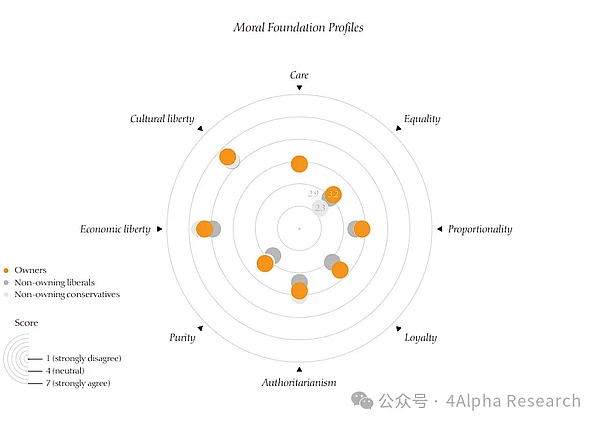
It is worth noting that Bitcoin holders present a unique feature of a greater focus on cultural freedom and equality; comparable to conservatives in holiness and loyalty, equal to liberals in caring, and economic freedom and authoritativeismThe above is between liberals and conservatives.
Therefore, we can conclude that while Bitcoin holders’ performance on a moral basis does not fully conform to the traditional liberal or conservative classification, they prefer liberal values, especially in terms of freedom and justice.At the same time, their position on other moral foundations is somewhere between liberals and conservatives, which showsBitcoin holders have unique diversity and complexity in their moral orientation.
Key factors affecting Bitcoin holdings
Although demographic characteristics, political tendencies, and moral basis have little to do with whether or not to hold Bitcoin, four key perceptions found in the survey significantly affect whether a person holds Bitcoin:
-
Trust in the underlying technology of Bitcoin: Includes trust in its security and accuracy.
-
Knowledge about Bitcoin: Including current understanding of Bitcoin and the level of attention to Bitcoin news.
-
The practicality of Bitcoin: Believe in the practicality of Bitcoin in daily trading or investment.
-
Ethical perception of Bitcoin: Believe that Bitcoin technology and users are ethical and believe that Bitcoin can improve society.
Respondents were asked to agree or disagree with these cognitively related statements.For example, the statement about trust is “I believe blockchain is 100% accurate.” The survey results show that there are significant differences between Bitcoin holders and non-holders in these aspects.Bitcoin holders generally have more confidence in their technology and believe that Bitcoin is morally positive.The non-holder shows distrust or neutral attitude.
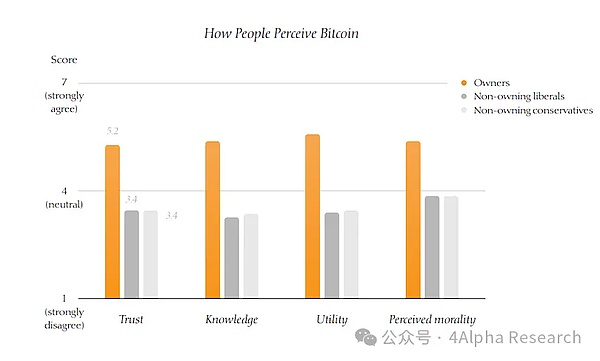
These cognitive factors are the key to determining whether to hold Bitcoin.Understanding Bitcoin technology will increase trust in its network, and then believe in its usefulness and be aware of the social benefits it may bring.These factors may incentivize individuals to buy or invest in Bitcoin.On the contrary, it may also be because individuals buy bitcoin first and regard it as an investment, and as value grows, their interest in the technology behind bitcoin increases, and in turn they agree more with their practicality and morality.Although it is impossible to determine which path causes this cognitive change, the overall effect is positive and the causal relationship may be bidirectional.
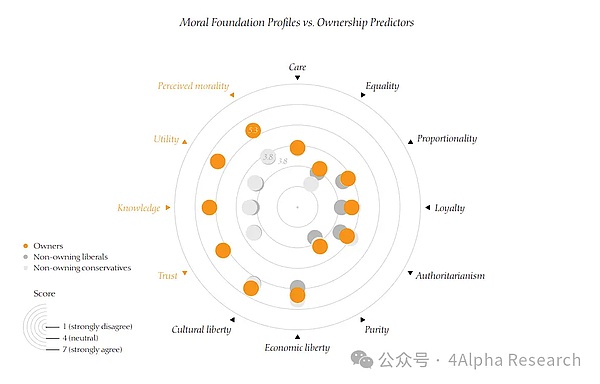
in conclusion
In the past, it was often believed that the political tendency of Bitcoin holders influenced their choices, but surveys showed that Bitcoin holders’ political stance did not have a clear bias.Whether liberal, conservative or centrist, Bitcoin holders exist in all groups.The only significant demographic difference is that Bitcoin holders are younger and predominantly male.
Research shows that Bitcoin possession has nothing to do with a specific social or political identity, but is closely related to an individual’s level of knowledge and perception of Bitcoin.Bitcoin holders are often those who have a deep understanding of technology, think it is practical, trustworthy, and morally acceptable.This positive attitude drives them to hold Bitcoin rather than simple political or social identity.
Ultimately, this shows that Bitcoin’s popularity is not limited to a particular political faction or social group, but is driven by individual understanding and acceptance of technology.This also means that the future development potential of Bitcoin depends on public awareness of its value and purpose, rather than political differences.
The content of this article is for information sharing only and does not promote or endorse any business and investment behavior. Readers are requested to strictly abide by the laws and regulations of the region and do not participate in any illegal financial behavior.We do not provide transaction entrances, guidance, issuance channel guidance, etc. for issuance, transactions and financing related to any virtual currency and digital collections.
4Alpha Research content is prohibited from reprinting, copying, etc. without permission, and violators will be held legally responsible.








